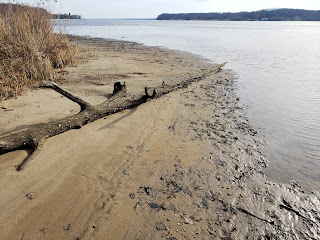a wicked creek
In an earlier post, "The Water's Not Fine," I addressed pollution in Potomac Creek and adjacent waters, and what this means for the Chesapeake Bay. Contrary to many reports, the Bay's health is in crisis. This fact, both dispiriting and angering, elicits a couple more observations here.
***
 |
| The Creek at low tide (R. Singh) |
[I]t should be clear that the expert is also the player in a political game, seeking to promote his [sic] private vision of goodness over others’. Planning is a component of politics. There is no escaping that truism.[i]
What this means is that while any qualified scientist could jot down on a napkin what needs to be done to clean up Potomac Creek and the Chesapeake Bay, we'd be no nearer to a solution. Water restoration requires an alignment of staff, resources, and will among a multitude of actors that often oppose each other: courts, states, municipalities, task forces, non-profits, industry, farmers, home builders, residents, scientists, and more. Just consider the committees of the Chesapeake Bay Program itself, which need a consensus -- not a majority -- to make decisions. That requirement alone makes problem solving near impossible. By their very nature, Rittel and Webber contend, wicked problems offer no definitive and objective “solutions.”
Put it all this way and fatalism about the Creek and the Chesapeake becomes easy. It’s beyond foolish simply to assume people will fix this mess in a meaningful time frame. What we really need is a hero. And, I would submit, we're living in an age largely devoid of "heroes" and leaders in any traditional sense.
So -- is there a solution? Maybe Potomac Creek will just have to rescue itself. (I'll share my ideas on this possibility another day.)
***
Observation number two concerns our ideas of life and land on Potomac Creek. Such notions do not change easily. As new people enter a place, however, they may bring different ideas that replace – and “re-place” – older traditions. A previously noted example of this is how Stafford County’s rapid demographic change is already propelling shifts in attitudes towards landownership and property rights.
 |
| The Creek (R. Singh) |
Science journalist Ed Yong uses the term Umwelt to describe the part of its surroundings "an animal can sense and experience – its perceptual world." Yong explains "Our Umwelt is all we know, and so we easily mistake it for all there is to know.” In a similar manner, environmentalist Ian McHarg encapsulates the dreamy Umwelt of humanism:
…that the cosmos is a pyramid erected to support man on its pinnacle, that reality exists only because man can perceive it, that God is made the image of man, and that the world consists solely in a dialogue between men.[ii]
 |
| The humanist's be-all and end-all, here seen out and about (R. Singh) |
This is the spiritual scaffolding -- the myth -- that makes the most sense to even the least spiritual among us. It suits “our” world, a world generally understood to be separate from nature.
People, Potomac Creek is telling us we need to find a better
myth.
[i] Rittel, Horst W.J.; Webber, Melvin M. (1973). "Dilemmas in a General Theory of Planning." (PDF). Policy Sciences. 4 (2): 155–169.
[iv] Ian McHarg, (213). “Values, Process, and Form.” The Fitness of Man’s Environment. Smithsonian Institution Press, 1968. Quoted in David Copland Morris, “Inhumanism, Environmental Crisis, and the Canon of American Literature.” Interdisciplinary Studies in Literature and Environment. (Fall 1997). 1-16.




Comments
Post a Comment